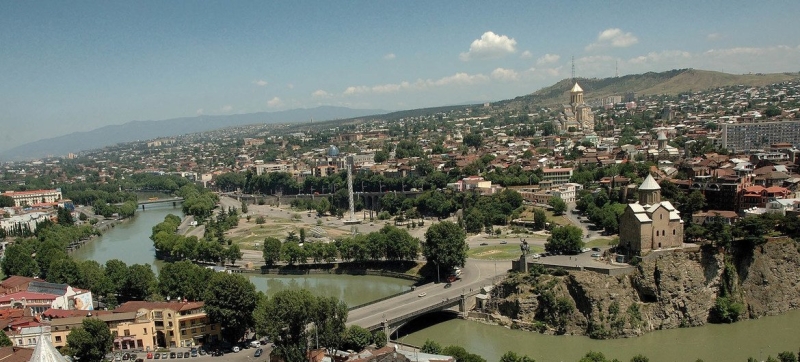
View of Georgia’s capital Tbilisi UN rights chief on Georgia protests Human Rights
Amid protests in Georgia that have been marred by violence, UN High Commissioner for Human Rights Volker Türk on Monday called on the country’s authorities to respect and protect the rights to freedom of speech and peaceful assembly. In a statement, the UN rights chief said police were using “disproportionate” and in some cases “unjustified” force to break up demonstrations.
Dozens of protesters and media workers were reportedly injured during demonstrations following Georgia’s prime minister’s announcement that talks on joining the European Union would be postponed. Security forces reportedly used pepper spray, water cannons and chemical irritants, and some protesters were beaten by unknown assailants.
“The use of unjustified or disproportionate force against protesters and media workers is extremely worrying,” Türk said, adding that all Georgians, regardless of their political views, should be able to freely and peacefully express their views on the future of the country.
As required by international human rights law, States must promote an enabling environment for the exercise of the right to peaceful assembly. Any use of force by security forces must be the exception and comply with the principles of legality, necessity, proportionality, precaution and non-discrimination.
The High Commissioner also called on protesters to exercise their rights peacefully. Some protesters reportedly threw stones and bottles at security forces and damaged the parliament building. The Interior Ministry said at least 113 of its employees were injured.
Read also:
UN calls on Georgia to repeal law that infringes on LGBTIQ+ rights
Georgia’s Special Investigative Service, an independent institution accountable to parliament that investigates allegations against law enforcement officers, announced that it had launched an investigation into abuses of power by police officers.
“All those responsible for violations must be held accountable, and allegations of ill-treatment of detainees must also be investigated,” the High Commissioner said.
One of the problems facing such investigations is the lack of individual identification numbers or name badges on the uniforms of special forces and special police officers.
“These incidents once again highlight the need to address this long-standing issue of individual accountability for law enforcement officers in Georgia,” Türk said.
According to a guide from the UN Human Rights Office, authorities should ensure that law enforcement officers can be identified, for example, by name badges or individual service numbers.
The latest figures from the Interior Ministry indicate that at least 224 people have been detained during the four-day protests. They have been charged with petty hooliganism and disobeying lawful police orders.
“Reports that children are among those detained are particularly alarming,” Türk said. “All their rights must be fully respected,” he added.
He called for the immediate and unconditional release of all those detained for legitimately exercising their rights to freedom of expression and peaceful assembly. Those charged must be guaranteed the rights to due process, the presumption of innocence, legal assistance, and the right to challenge the lawfulness of their pre-trial detention, the High Commissioner stressed.
“I call on all sectors of society to maintain a peaceful environment and resolve any differences through transparent and inclusive dialogue, and to use established legal procedures based on the rule of law,” Türk said.
